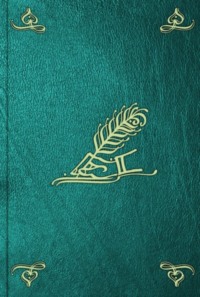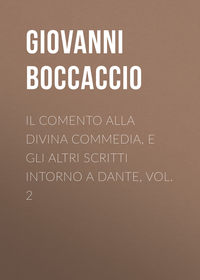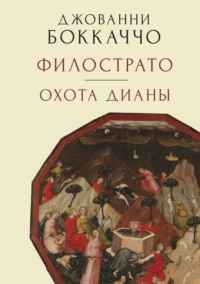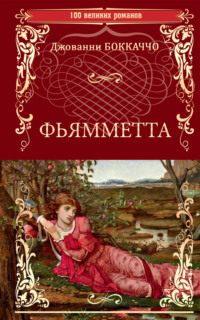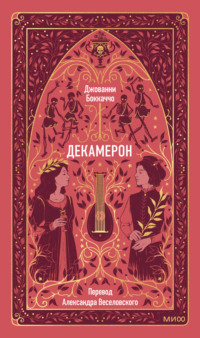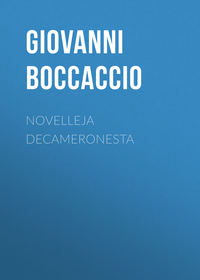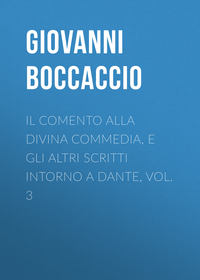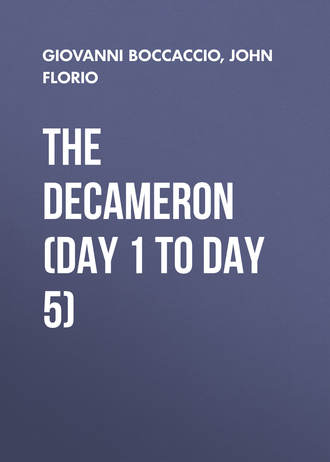 полная версия
полная версияThe Decameron (Day 1 to Day 5)
Notwithstanding all that hee had spoken, yet shee replied not one word, wherefore the Magnifico arose, and returned to the Knight, who went to meete him, saying in a loude laughter. How now man? have I not kept my promise with thee? No Sir, answered the Magnifico, for you promised I should speake with your wife, and you have made mee talke to a marble Statue. This answere was greatly pleasing to the Knight, who, although hee had an undoubted opinion of his wife; yet this did much more strengthen his beliefe, and hee said. Now thou confessest thy Gelding to bee mine? I doe, replied the Magnifico, but if I had thought, that no better successe would have ensued on the bargaine; without your motion for the horse, I would have given him you: and I am sorie that I did not, because now you have bought my horse, and yet I have not sold him. The Knight laughed heartily at this answere, and being thus provided of so faire a beast, he rode on his journey to Millaine, and there entred into his authority of Podesta.
The Lady remained now in liberty at home, considering on the Magnificoes words, and likewise the Gelding, which (for her sake) was given to her husband. Oftentimes shee saw him passe to and fro before her windowe, still looking when the Flagge of defiance should be hanged forth, that hee might fight valiantly under her Colours. The Story saith, that among many of her much better meditations, she was heard to talke thus idely to herselfe. What doe I meane? Wherefore is my youth? The olde miserable man is gone to Millaine, and God knoweth when hee comes backe againe, ever, or never. Is dignity preferred before wedlockes holy duty, and pleasures abroade, more then comforts at home? Ill can age pay youths arrerages, when time is spent, and no hope sparde. Actions omitted, are often times repented, but done in due season, they are sildome sorrowed for. Upon these un-Lady-like private consultations, whether the window shewed the signall or no; it is no matter belonging to my charge: I say, husbands are unwise, to graunt such ill advantages, and wives much worse, if they take hold of them, onely judge you the best, and so the Tale is ended.
Ricciardo Minutolo fell in love with the Wife of Philippello Fighinolfi, and knowing her to be very jealous of her Husband, gave her to understand, that he was greatly enamoured of his wife, and had appointed to meete her privately in a Bathing house, on the next day following: Where she hoping to take him tardie with his close compacted Mistresse, found herselfe to be deceived by the said RicciardoThe sixth Novell
Declaring, how much perseverance, and a couragious spirit is availeable in loveNo more remained to be spoken by Madame Eliza, but the cunning of the Magnifico, being much commended by all the company: the Queene commanded Madame Fiammetta, to succeede next in order with one of her Novels, who (smilingly) made answere that she would, and began thus. Gracious Ladies, me thinkes wee have spoken enough already, concerning our owne Citie, which as it aboundeth copiously in all commodities, so is it an example also to every convenient purpose. And as Madam Eliza hath done, by recounting occasions happening in another World, so must we now leape a little further off, even so farre as Naples, to see how one of those Saint-like Dames, that nicely seemes to shun Loves allurings, was guided by the good spirit to a friend of hers, and tasted of the fruite, before shee knew the flowers. A sufficient warning for you, to apprehend before hand, what may follow after; and to let you see beside, that when an error is committed, how to be discreete in keeping it from publike knowledge.
In the City of Naples, it being of great antiquity, and (perhaps) as pleasantly scituated, as any other City in all Italie, there dwelt sometime a young Gentleman, of noble parentage, and well knowne to be wealthy, named Ricciardo Minutolo, who, although hee had a Gentlewoman (of excellent beauty, and worthy the very kindest affecting) to his wife; yet his gadding eye gazed else-where, and he became enamoured of another, which (in generall opinion) surpassed all the Neapolitane women else, in feature, favour, and the choysest perfections, shee being named Madam Catulla, wife to as gallant a young Gentleman, called Philippello Fighinolfi, who most dearely he loved beyond all other, for her vertue and admired chastity.
Ricciardo loving this Madam Catulla, and using all such meanes, whereby the grace and liking of a Lady might be obtained; found it yet a matter beyond possibility, to compasse the height of his desire: so that many desperate and dangerous resolutions beleagred his braine, seeming so intricate, and unlikely to affoord any hopefull issue, as he wished for nothing more then death. And death (as yet) being deafe to all his earnest imprecations, delayed him on in lingering afflictions, and continuing still in such an extreame condition, he was advised by some of his best friends, utterly to abstaine from this fond pursuite, because his hopes were meerely in vaine, and Madam Catulla prized nothing more precious to her in the World, then unstayned loyaltie to her Husband; and yet shee lived in such extreme jealousie of him, as fearing least some bird flying in the Ayre, should snatch him from her.
Ricciardo not unacquainted with this her jealous humour, as well by credible hearing thereof, as also by daily observation; began to consider with himselfe, that it were best for him, to dissemble amorous affection in some other place, and (hence-forward) to set aside all hope, of ever enjoying the love of Madam Catulla, because he was now become the servant to another Gentlewoman, pretending (in her honour) to performe many worthy actions of Armes, Jousts, Tournaments, and all such like noble exercises, as he was wont to doe for Madam Catulla. So that almost all the people of Naples, but especially Madam Catulla, became verily perswaded, that his former fruitlesse love to her was quite changed, and the new elected Lady had all the glory of his best endeavours, persevering so long in this opinion, as now it passed absolutely for currant. Thus seemed he now as a meere Stranger to her, whose house before he familiarly frequented; yet (as a neighbour) gave her the dayes salutations, according as he chanced to see her, or meete her.
It came to passe, that it being now the delightfull Summer season, when all Gentlemen and Gentlewomen used to meete together (according to a custome long observed in that Countrey) sporting along on the Sea Coast, dining and supping there very often. Ricciardo Minutolo happened to heare, that Madam Catulla (with a company of her friends) intended also to be present there among them, at which time, consorted with a seemely traine of his confederates, he resorted thither, and was graciously welcommed by Madam Catulla, where he pretended no willing long time of tarrying; but that Catulla and the other Ladies were faine to entreate him, discoursing of his love to his new elected Mistresse: which Minutolo graced with so solemne a countenance, as it ministred much more matter of conference, all coveting to know what shee was.
So farre they walked, and held on this kinde of discoursing, as every Lady and Gentlewoman, waxing weary of too long a continued argument, began to separate her selfe with such an associate as shee best liked, and as in such walking women are wont to doe; so that Madam Catulla having few females left with her, stayed behind with Minutolo, who suddenly shot foorth a word, concerning her husband Philippello, & of his loving another woman beside her selfe. She that was overmuch jealous before, became so suddenly set on fire, to know what shee was of whom Minutolo spake; as shee sate silent a long while, till being able to containe no longer, shee entreated Ricciardo, even for the Ladies sake, whose love he had so devoutly embraced, to resolve her certainely, in this strange alteration of her Husband; whereunto thus he answered.
Madam, you have so straitly conjured me, by urging the remembrance of her; for whose sake I am not able to denie any thing you can demand, as I am ready therein to pleasure you. But first you must promise me, that neither you, or any other person for you, shall at any time disclose it to your Husband, untill you have seene by effect, that which I have tolde you proveth to be true: and when you please, I will instruct you how your selfe shall see it. The Lady was not a little joyfull, to be thus satisfied in her Husbands follie, and constantly crediting his words to be true, shee sware a solemne oath, that no one alive should ever know it. So stepping a little further aside, because no listening eare should heare him, thus he beganne.
Lady, if I did love you now so effectually, as heretofore I have done, I should be very circumspect, in uttering any thing which I imagined might distaste you. I know not whether your Husband Philippello, were at any time offended; because I affected you, or beleeved, that I received any kindnesse from you: but whether it were so or no, I could never discerne it by any outward apparance. But now awaiting for the opportunity of time, which he conceived should affoord me the least suspition; he seekes to compasse that, which (I doubt) he feares I would have done to him, in plaine termes Madam, to have his pleasure of my wife. And as by some carriages I have observed, within few dayes past, he hath solicited and pursued his purpose very secretly, by many Ambassages, and other meanes, as (indeede) I have learned from her selfe, and alwayes shee hath returned in such answers, as shee received by my direction.
And no longer agoe Madam, then this very morning, before my comming hither, I found a woman messenger in my House, in very close conference with my Wife, when growing doubtfull of that which was true indeede, I called my Wife, enquiring, what the woman would have with her; and shee tolde me it was another pursuite of Philippello Fighinolfi, who (quoth shee) upon such answers as you have caused me to send him from time to time, perhaps doth gather some hope of prevailing in the ende, which maketh him still to importune me as he doth. And now he adventureth so farre, as to understand my finall intention, having thus ordered his complot, that when I please, I must meete him secretly in an house of this City, where he hath prepared a Bath ready for me, and hopeth to enjoy the ende of his desire, as very earnestly he hath solicited me thereto. But if you had not commanded me, to hold him in suspence with so many frivolous answers; I would (long ere this) have sent him such a message, as should have beene little to his liking.
With patience (Madam) I endured all before, but now (me thinkes) he proceedeth too farre, which is not any way to be suffered; and therefore I intended to let you know it, whereby you may perceive, how well you are rewarded, for the faithfull and loyall love you beare him, and for which I was even at the doore of death. Now, because you may be the surer of my speeches, not to be any lies or fables, and that you may (if you be so pleased) approve the trueth by your owne experience: I caused my Wife to send him word, that shee would meete him to morrow, at the Bathing-house appointed, about the houre of noone-day, when people repose themselves, in regard of the heates violence; with which answere the woman returned very jocondly. Let me now tell you Lady, I hope you have better opinion of my wit, then any meaning in me, to send my wife thither; I rather did it to this ende, that having acquainted you with his treacherous intent, you should supply my wives place, by saving both his reputation and your owne, and frustrating his unkind purpose to me. Moreover, upon the view of his owne delusion, wrought by my wife in meere love to you, he shall see his foule shame, and your most noble care, to keepe the rites of marriage betweene you still unstained.
Madame Catulla, having heard this long and unpleasing report; without any consideration, either what he was that tolde the tale, or what a treason he intended against her: immediatly (as jealous persons use to doe) she gave faith to his forgerie, and began to discourse many things to him, which imagination had often misguided her in, against her honest minded husband, and enflamed with rage, suddenly replied; that shee would doe according as he had advised her, as being a matter of no difficulty. But if he came, she would so shame and dishonour him, as no woman whatsoever should better schoole him. Ricciardo highly pleased herewith; & being perswaded, that his purpose would take the full effect: confirmed the Lady in her determination with many words more; yet putting her in memory, to keepe her faithfull promise made, without revealing the matter to any living person, as shee had sworne upon her faith.
On the morrow morning, Ricciardo went to an auncient woman of his acquaintance, who was the Mistresse of a Bathing-house, and there where he had appointed Madame Catulla, that the Bath should be prepared for her, giving her to understand the whole businesse, and desiring her to be favourable therein to him. The woman, who had beene much beholding to him in other matters, promised very willingly to fulfill his request, concluding with him, both what should be done and said. She had in her house a very darke Chamber, without any window to affoord it the least light, which Chamber shee had made ready, according to Ricciardoes direction, with a rich Bed therein, so soft and delicate as possible could be, wherein he entred so soone as he had dined, to attend the arrivall of Madame Catulla. On the same day, as she had heard the speeches of Ricciardo, and gave more credit to them then became her; shee returned home to her house in wonderfull impatience. And Philippello her husband came home discontentedly too, whose head being busied about some worldly affaires, perhaps he looked not so pleasantly, neither used her so kindly, as he was wont to doe. Which Catulla perceiving, shee was ten times more suspicious then before, saying to herselfe. Now apparant trueth doth disclose it selfe, my husbands head is troubled now with nothing else, but Ricciardoes wife, with whom (to morrow) he purposeth his meeting; wherein he shall be disappointed, if I live; taking no rest at all the whole night, for thinking how to handle her husband.
What shall I say more? On the morrow, at the houre of mid-day, accompanied onely with her Chamber-mayde, and without any other alteration in opinion; shee went to the house where the Bath was promised; and meeting there with the olde woman, demaunded of her, if Philippello were come thither as yet or no? The woman, being well instructed by Ricciardo, answered: Are you shee that should meete him heere. Yes, replied Catulla. Goe in then to him (quoth the woman) for he is not farre off before you.
Madame Catulla, who went to seeke that which she would not finde, being brought vailed into the darke Chamber where Ricciardo was, entred into the Bath, hoping to finde none other there but her husband, and the custome of the Countrey, never disallowed such meetings of men with their wives, but held them to be good and commendable. In a counterfeit voyce he bad her welcome, and she, not seeming to be any other then she was indeed, entertained his embracings in as loving manner; yet not daring to speake, least he should know her, but suffered him to proceede in his owne error.
Let passe the wanton follies passing betweene them, and come to Madame Catulla, who finding it a fit and convenient time, to vent forth the tempest of her spleene, began in this manner. Alas! how mighty are the misfortunes of women, and how ill requited is the loyall love, of many wives to their husbands? I, a poore miserable Lady, who, for the space of eight yeares now fully compleated, have loved thee more dearely then mine owne life, finde now (to my hearts endlesse griefe) how thou wastest and consumest thy desires, to delight them with a strange woman, like a most vile and wicked man as thou art. With whom doest thou now imagine thy selfe to be? Thou art with her, whom thou hast long time deluded by false blandishments, feigning to affect her, when thou doatest in thy desires else-where. I am thine owne Catulla, and not the wife of Ricciardo, trayterous and unfaithfull man, as thou art. I am sure thou knowest my voyce, and I thinke it a thousand yeares, untill wee may see each other in the light, to doe thee such dishonour as thou justly deserveth, dogged, disdainefull, and villainous wretch. By conceiving to have another woman in thy wanton embraces, thou hast declared more joviall disposition, and demonstrations of farre greater kindnesse, then domesticke familiarity. At home thou lookest sower, sullen or surly, often froward, and sildome well pleased. But the best is, whereas thou intendest this husbandrie for another mans ground, thou hast (against thy will) bestowed it on thine owne, and the water hath runne a contrary course, quite from the current where thou meantst it.
What answere canst thou make, devill, and no man? What, have my words smitten thee dumbe? Thou mayest (with shame enough) hold thy peace, for with the face of a man, and love of an husband to his wife, thou art not able to make any answere.
Ricciardo durst not speake one word, but still expressed his affable behaviour towards her, bestowing infinite embraces and kisses on her: which so much the more augmented her rage and anger, continuing on her chiding thus. If by these flatteries and idle follies, thou hopest to comfort or pacifie me, thou runnest quite byas from thy reckoning: for I shall never imagine my selfe halfe satisfied, untill in the presence of my parents, friends, and neighbours, I have revealed thy base behaviour. Tell mee, treacherous man, am not I as faire, as the wife of Ricciardo? Am I not as good a Gentlewoman borne, as shee is? What canst thou more respect in her, then is in mee? Villaine, monster, why doest thou not answere mee? I will send to Ricciardo, who loveth mee beyond all other women in Naples, and yet could never vaunt, that I gave him so much as a friendly looke: he shall know, what a dishonour thou hadst intended towards him; which both he and his friends will revenge soundly upon thee.
The exclamations of the Lady were so tedious and irksome, that Ricciardo perceiving, if she continued longer in these complaints, worse would ensue thereon, then could be easily remedied: resolved to make himselfe knowne to her, to reclaime her out of this violent extasie, and holding her somewhat strictly, to prevent her escaping from him, he said. Madam, afflict your selfe no further, for, what I could not obtaine by simply loving you, subtilty hath better taught me, and I am your Ricciardo, which she hearing, and perfectly knowing him by his voyce; shee would have leapt out of the Bath, but shee could not, and to avoyde her crying out, he layde his hand on her mouth, saying. Lady, what is done, cannot now be undone, albeit you cried out all your lifetime. If you exclaime, or make this knowne openly by any meanes; two unavoydable dangers must needes ensue thereon. The one (which you ought more carefully to respect) is the wounding of your good renowne and honour, because, when you shall say, that by treacherie I drew you hither: I will boldly maintaine the contrary, avouching, that having corrupted you with gold, and not giving you so much as covetously you desired; you grew offended, and thereon made the out-cry, and you are not to learne, that the world is more easily induced to beleeve the worst, then any goodnesse, be it never so manifest. Next unto this, mortall hatred must arise betweene your husband and me, and (perhaps) I shall as soone kill him, as he mee; whereby you can hardly live in any true contentment after. Wherefore, joy of my life, doe not in one moment, both shame your selfe, and cause such perill betweene your husband and me: for you are not the first, neither can be the last, that shall be deceived. I have not beguiled you, to take any honour from you, but onely declared, the faithfull affection I beare you, and so shall doe for ever, as being your bounden and most obedient servant; and as it is a long time agoe, since I dedicated my selfe and all mine to your service, so hence-forth must I remaine for ever. You are wise enough (I know) in all other things; then shew your selfe not to be silly or simple in this.
Ricciardo uttered these words, teares streaming aboundantly downe his cheekes, and Madame Catulla (all the while) likewise showred forth her sorrowes equally to his, now, although she was exceedingly troubled in minde, and saw what her owne jealous folly had now brought her to, a shame beyond all other whatsoever: in the midst of her tormenting passions, she considered on the words of Ricciardo, found good reason in them, in regard of the unavoydable evils, whereupon shee thus spake. Ricciardo, I know not how to beare the horrible injurie, and notorious treason used by thee against me, grace and goodnesse having so forsaken me, to let me fall in so foule a manner. Nor becommeth it me, to make any noyse or out-cry heere, whereto simplicity, or rather devillish jealousie, did conduct me. But certaine I am of one thing, that I shall never see any one joyfull day, till (by one meanes or other) I be revenged on thee. Thou hast glutted thy desire with my disgrace, let me therefore goe from thee, never more to looke upon my wronged husband, or let any honest woman ever see my face.
Ricciardo perceiving the extremity of her perplexed minde, used all manly and milde perswasions, which possibly he could devise to doe, to turne the torrent of this high tide, to a calmer course; as by outward shew shee made apparance of, untill (in frightfull feares shunning every one shee met withall, as arguments of her guiltinesse) shee recovered her owne house, where remorse so tortured her distressed soule, that shee fell into so fierce a melancholy, as never left her till shee died. Upon the report whereof, Ricciardo becomming likewise a widdower, and grieving extraordinarily for his haynous transgression, penitently betooke himselfe to live in a wildernesse, where (not long after) he ended his dayes.
Thebaldo Elisei, having received an unkinde repulse by his beloved, departed from Florence, and returning thither againe (a long while after) in the habite of a Pilgrime; he spake with her, and made his wrongs knowne unto her. He delivered her Father from the danger of death, because it was proved, that he had slaine Thebaldo: he made peace with his brethren, and in the ende, wisely enjoyed his hearts desireThe seaventh Novell
Wherein is signified the power of Love, and the diversity of dangers, whereinto men may daily fallSo ceased Fiammetta her discourse, being generally commended, when the Queene, to prevent the losse of time, commanded Æmillia to follow next, who thus began. It liketh me best (gracious Ladies) to returne home againe to our owne City, which it pleased the former two discoursers to part from: And there I will shew you, how a Citizen of ours, recovered the kindnesse of his Love, after he had lost it.
Sometime there dwelt in Florence a young gentleman, named Thebaldo Elisei, descended of a noble House, who became earnestly enamored of a Widdow, called Hermelina, the daughter to Aldobrandino Palermini: well deserving, for his vertues and commendable qualities, to enjoy of her whatsoever he could desire. Secretly they were espoused together, but Fortune, the enemy to Lovers felicities, opposed her malice against them, in depriving Thebaldo of those deare delights, which sometime he held in free possession, and making him as a stranger to her gracious favours. Now grew shee contemptibly to despise him, not onely denying to heare any message sent from him, but scorning also to vouchsafe so much as a sight of him, causing in him extreme griefe and melancholy, yet concealing all her unkindnesse so wisely to himselfe, as no one could understand the reason of his sadnesse.


